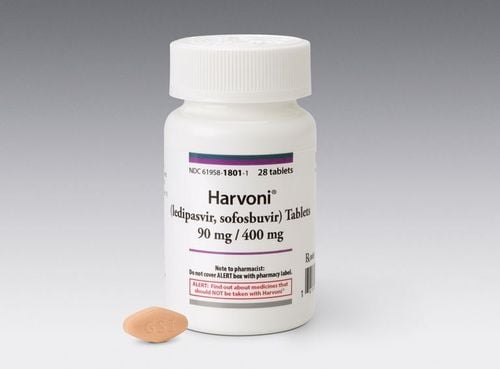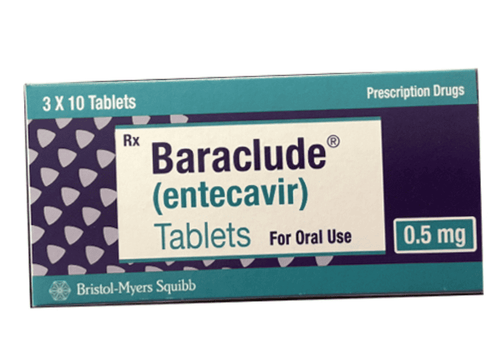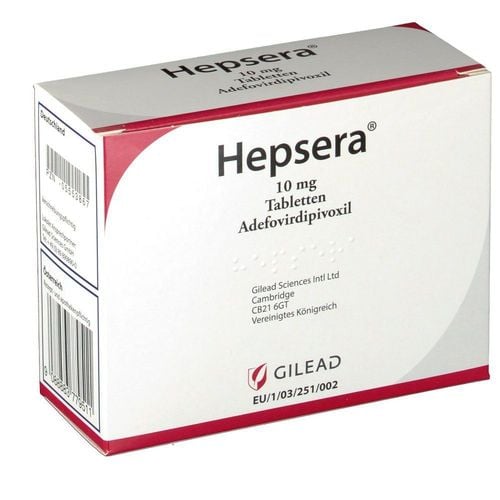This is an automatically translated article.
Agimidin is commonly prescribed by doctors mainly to treat cases of hepatitis B or advanced hepatitis. To prevent the risk of experiencing side effects when using Agimidin, patients should take the drug exactly as recommended by the doctor.
1. What is Agimidin?
Agimidin belongs to the group of drugs for the treatment of chronic hepatitis B, prescribed for patients 16 years of age and older with documented HBV replication and progressive hepatitis. Agimidin is prepared in the form of film-coated tablets, each box contains 3 blisters x 10 tablets.
In each tablet of Agimidin contains the main active ingredient is Lamivudin 100mg and some other excipients just enough. Agimidin has a shelf life of 36 months from the date of manufacture. Patients should consult their doctor about dosage and administration before deciding on treatment with Agimidin.
2. What does Agimidin do?
Active ingredient Lamivudin in Agimidin is an antiviral drug, which is evaluated to have strong activity against hepatitis B virus on all tested cell lines. In general, Lamivudine is well absorbed by the gastrointestinal system after ingestion, with bioavailability in adults ranging from 80 to 85%.
Thanks to the antiviral effect of Lamivudin, Agimidin is often prescribed by doctors to treat the following cases:
Treatment of chronic hepatitis B for patients over 16 years of age with signs HBV virus cross-replication. Treatment of advanced hepatitis with one or more other problems such as decompensated liver disease, cirrhosis, 2 times normal serum ALT level, immune system damage, necrotizing inflammatory liver disease manifested above biopsy or liver transplant. However, the use of Agimidin is contraindicated in the following patients:
Patients with allergies or a history of hypersensitivity to the active ingredient Lamivudin or any other excipients in the drug. Do not use Agimidin for people with severe kidney disease. Agimidin is contraindicated in patients under 16 years of age.
3. Dosage and how to use Agimidin
3.1 Dosage of Agimidin The dose of Agimidin will be determined based on each patient, including:
Patients > 16 years old: Take the recommended dose of 100mg Lamivudin / time / day. Maintenance treatment for 6-12 months. Patients with renal impairment with creatinine clearance <50ml/min: A dose reduction of Lamivudine should be considered as directed by the physician. Patients with HIV: 300mg/day x 2 times/day. 3.2 Instructions for proper use of Agimidin Since Agimidin is in the form of tablets, it should be taken orally. Patients should take the drug after eating so as not to affect the digestive system. Absolutely do not chew the tablet, instead the patient should swallow the whole tablet with a sufficient amount of filtered water.
During the treatment of hepatitis with Agimidin, it is necessary to monitor the patient's response to the drug. The specific duration of treatment will be recommended by the doctor based on the assessment of the severity of the disease. If the following occur, the patient should consider discontinuing the drug and notify the physician immediately:
The patient has a normal immune system but has documented HBsAg or HBeAg seroconversion. The patient is pregnant during treatment with Agimidin. Patients with symptoms of drug intolerance during treatment. If the drug Agimidin does not bring the expected therapeutic effect to the patient, the doctor will evaluate the condition and consider alternative therapy.
3.3 What to do in case of an overdose of Agimidin? According to the results of acute animal studies, the use of high doses of Lamivudine did not cause organ toxicity. There have also been no recorded cases of death following an overdose of Lamivudine. If unusual symptoms are encountered, most patients recover after stopping treatment.
Ideally, to ensure safety and avoid unfortunate risks when taking an overdose of Agimidin, patients need to notify their doctor immediately for measures to be taken. Symptomatic supportive measures of overdose may be used and patients should be closely monitored for physical reactions. In addition, because the active ingredient Lamivudin is dialyzable, doctors will perform dialysis for patients who have overdosed.
4. Possible side effects when using Agimidin
In certain cases, the use of Agimidin can cause patients to experience some of the following side effects:
Respiratory tract infections. Fatigue or discomfort. Headache. Pain or discomfort in the abdomen. Diarrhea. Nausea or vomiting. Lactic acidosis. Big liver. Severe fatty liver. Pancreatitis. A mutant virus strain appeared. When any of the side effects mentioned above appear during treatment with Agimidin, the patient should discontinue use and notify the doctor as soon as possible for timely correction.
5. Important notes when treating with Agimidin
Here are a few things that patients should keep in mind when taking Agimidin:
Caution should be exercised when using Agimidin in people at risk associated with liver disease, such as hepatomegaly, lactic acidosis, or severe steatosis. . Agimidin should not be used by people who have both hepatitis B virus and HIV infection. There is a risk of elevation of serum ALT and re-emergence of HBV DNA after discontinuation of Agimidin. Several cases of patients developed pancreatitis after treatment for hepatitis with Agimidin, especially in children with HIV and prior Nucleoside therapy. It is necessary to monitor the patient's health status during the treatment of hepatitis B with Agimidin. There is an increased risk of hepatitis recurrence after discontinuation of Agimidin, which is particularly severe in people with decompensated liver disease. Ideally, patients should be monitored for liver function, including bilirubin and ALT levels for at least 4 months to detect early signs of viral hepatitis recurrence. Caution should be exercised when administering Agimidin to liver transplant recipients, patients infected with both HBV and HCV, HIV or Delta hepatitis.
6. Is there any risk of drug interactions with Agimidin?
According to the study, the drug interaction ability of Agimidin is relatively low because the active ingredient Lamivudin is limited in metabolism and protein binding, on the other hand, the drug is almost completely eliminated by the kidneys in unchanged form.
To avoid interactions, patients should not use Lamivudin with Zalcitabine at the same time. In addition, there may be some other drugs that interact with Lamivudin and affect the therapeutic effect of the drug. Ideally, patients should inform their doctor about any medications they are currently taking, including prescription, over-the-counter, herbal, or natural products.
In summary, Agimidin is indicated in the treatment of hepatitis B, patients need to consult a doctor before using the drug and use the drug exactly as prescribed to get the best treatment results. .
Please dial HOTLINE for more information or register for an appointment HERE. Download MyVinmec app to make appointments faster and to manage your bookings easily.













